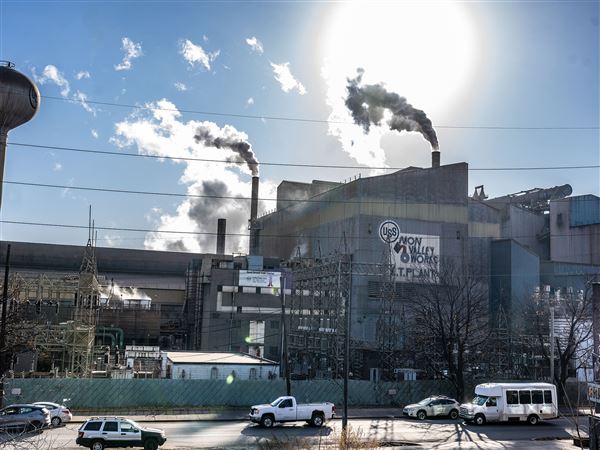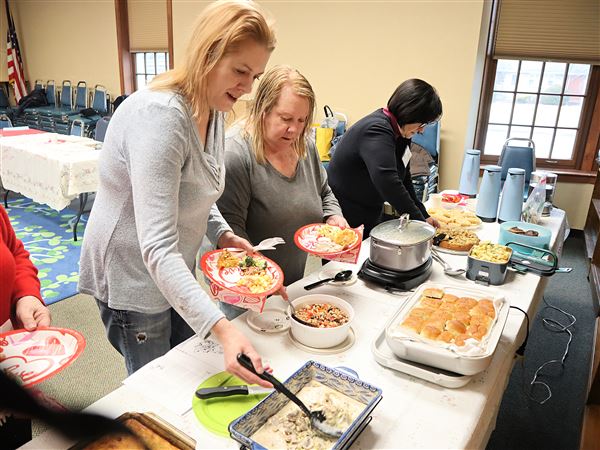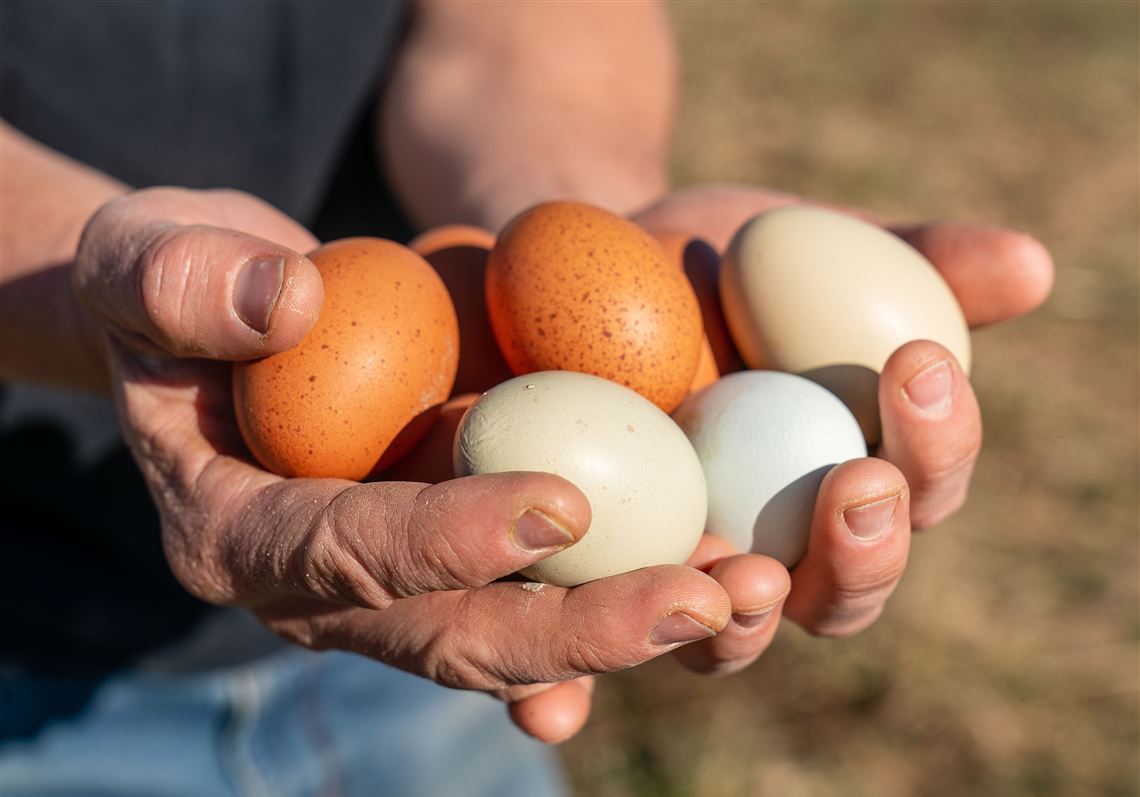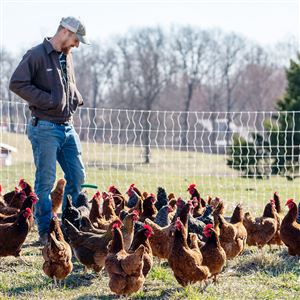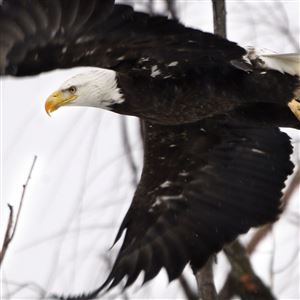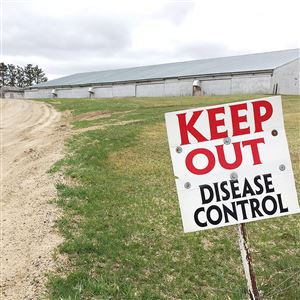A highly contagious animal disease is spreading across the country, disrupting a multi-billion-dollar Pennsylvania industry and raising the price of breakfast.
The current U.S. outbreak of highly pathogenic avian influenza, or HPAI began in April 2022 and has resulted in the deaths of more than 50 million domestic birds nationwide. In the last 30 days the most new cases have erupted in Pennsylvania.
Primarily infectious to birds, variants of the virus can jump to other species. It has killed sea lions in Peru, seals in Europe and wild mammals in 12 American states and seven Canadian provinces. When an earlier strain of the disease was discovered in 2003, 880 humans were infected worldwide, some fatally. Initially, the human cases were restricted to Asia, mostly China where the influenza is believed to have originated.
According to the U.S. Centers for Disease Control and Prevention, the current strain of HPAI has infected four Americans who were cleaning pens where the disease was confirmed. No human deaths occurred. The disease is believed to spread through inhalation and contact with the eyes or nasal tissue. It can not be contracted from consuming chicken eggs or meat. CDC stated that U.S. detections do not present an immediate public health concern.
Most of the disease’s avian victims have been commercially raised chickens that were euthanized to stop the pathogen from spreading. Several strains of the disease – also called “avian influenza,” “avian flu” and “bird flu” – are spreading with consequences felt by multinational corporations and families.
The impact was apparent at restaurants and kitchen tables in the final days of 2022 when the price of eggs rose to $5.29 a dozen, a spike attributed to commercial poultry losses and lingering COVID-19 supply line disruptions. A dozen eggs now cost about $2.90 nationwide, but avian flu continues to spread.
The disease has impacted birds in four general categories. Millions of chickens raised at enclosed poultry operations are most vulnerable. Also susceptible are small “backyard flocks” that usually live in quarters sometimes called hen houses. Those chickens are raised as pets, for the family’s source of eggs or as a small for-profit hobby. Bird flu can also impact ducks and other farm poultry as well as wild birds. But the current strain, EA (Eurasian) H5N1, thrives and spreads most aggressively in tight enclosures. Least likely to contract the disease are free-range chickens raised mostly outdoors.
The U.S. Department of Agriculture says 796 flocks in 47 states, including 321 commercial flocks and 475 backyard flocks, have been impacted by HPAI with a total loss of 58.62 million birds nationwide.
The Pennsylvania poultry market is a $7.1 billion industry supporting more than 26,000 jobs. The state Department of Agriculture reported that in the last 12 months, 30 commercial flocks and 32 backyard flocks totaling some 4,628,000 birds were infected in Pennsylvania. Most notably, in the last 30 days, more than 215,000 chickens in Pennsylvania have been newly affected by avian flu. The highest concentration lived at poultry operations in Lancaster, Bucks and Chester counties.
All cases are not fatal. But when chickens raised for commerce contract avian flu, they suffer respiratory congestion and a high mortality rate. Sick or not, all chickens living at a facility where the disease has been confirmed are considered “infected” and thousands have been euthanized by order of the state Agriculture Department. If the disease is confirmed, operators are responsible for removing the birds from the facility, euthanizing and disposing of them and cleaning and disinfecting the pens to the satisfaction of the Agriculture Department before operations can continue.
Chicken farm operators required to eliminate their flocks are partially reimbursed by USDA. Pennsylvania is the only state to have a dedicated fund of $25 million to help producers fill the gap in covering losses.
Chickens raised on free-range farms are less likely to contract avian flu. Adam Mason, owner and operator of HEAL Farms in Apollo, Armstrong County, said fresh air, natural food and comfortable living conditions make all the difference in his 130-chicken flock.
“Since our birds are out on the pasture, we have very little concern about a lot of the pathogens that the big commercial groups deal with,” he said. “There’s a lot of natural sterilization from the sun. They’re running around scratching for insects, eating earthworms. In our kind of operation there are hardly any cases of avian flu.”
HEAL Farms chickens are rotated among pastures every seven days and in winter they run on grasses sprouting from warm mulch. Mr. Mason said his “girls” lay eggs containing no growth hormones or antibiotics. To maintain biosecurity, most of his fresh egg business is conducted online.
But maintaining superior health can be expensive. HEAL Farms’ colorful eggs sell for $7 per dozen,.
Representatives of Pittsburgh’s biggest bird manageries said they improved biological containment during HPAI’s first U.S. epidemic in 2020,
“It has been a recurring issue,” said Alex Cauley of the Pittsburgh Zoo and Aquarium. “We have different levels of safety precaution areas for some of our bird residents – footbaths, overhead screening and also quarantining as the risk goes higher.”
Molly Toth of the National Aviary said the health and safety of their birds is a priority, and avian care professionals monitor residents daily.
“We’re monitoring the spread of HPAI as more information emerges,” she said. “Most of the birds at the National Aviary live in indoor habitats. The habitats that are outdoors are specifically designed to prevent any exposure to wildlife that could be carrying HPAI.”
Researchers have debated the role of wild animals in the spread of the current strain. The virus has been confirmed in wild birds that were found dead, and their flight range could explain avian flu’s rapid spread across America. The disease was first detected in wild birds in Pennsylvania in May 2022. But most bird flu hotspots are located at facilities where chickens are housed in crowded indoor pens.
Andrew Di Salvo, chief veterinarian for the Pennsylvania Game Commission, said the viral strain responsible for the ongoing outbreak has been detected in wild birds at a few locations in the commonwealth this year.
“The Game Commission only holds authority over wild birds and as such, we have not been involved in any HPAI surveillance of domestic poultry,” he said. “It is essential that domestic poultry owners maintain rigorous biosecurity to prevent diseases from being introduced to their flocks.”
Russell Redding, secretary of the Pennsylvania Department of Agriculture, said chicken operations should follow protocols to keep their facilities free of avian flu.
“The best line of offense is a strong defense,” he said in a statement. “Biosecurity is the best way to ensure your farm and poultry are safeguarded against disease. Poultry producers should review and use strong biosecurity practices as part of their daily routine.”
No realistic obstacles are in sight that might slow the spread of HPAI. A vaccine is under development that would require the injection of every individual chicken at a commercial facility.
In Pennsylvania, legislation has been proposed that would partially protect chicken operations. House Bill 1516, the Rapid Response Disaster Readiness Account, is sponsored by Rep. Martin Causer, R-Cameron, McKean and Potter counties. The bill would allow the Department of Agriculture to allocate funding during agricultural disasters to quickly send animal or plant health officials to contain outbreaks or threats including pathogens such as avian influenza.
John Hayes: jhayes@post-gazette.com.
First Published: March 19, 2023, 10:00 a.m.
Updated: March 20, 2023, 12:04 p.m.

